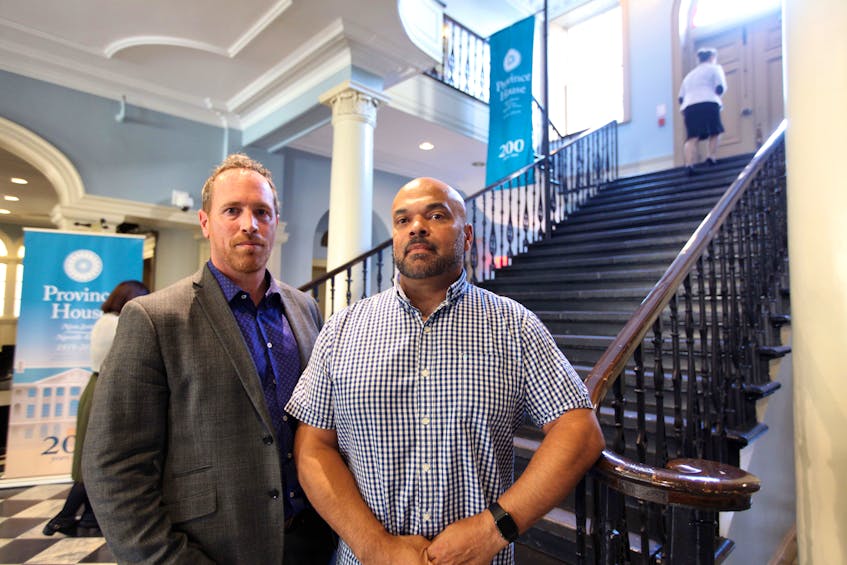The Nova Scotia Crown Attorneys' Association is accusing the province of bad faith bargaining for taking away its right to arbitration a day after the group rejected the government’s final contract offer.
Finance Minister Karen Casey introduced legislation Wednesday that gives the group of roughly 100 provincial Crown lawyers the right to strike but eliminates the option of a third party deciding whether the association’s ask for a 17 per cent pay increase over four years is warranted.
The Public Prosecution Service’s contract expired March 31, and both sides remain far apart. The province offer of a seven per cent increase over four years falls well short of what the association is willing to accept. Once the bill that amends the Crown Attorney’s Labour Relations Act passes, a strike could come as soon as mid-November.
Perry Borden, the association’s president, arrived at the legislature with about 60 other provincial Crown Attorneys to protest the bill.
He said the association was never notified of the bill and its members were blindsided by the province’s heavy-handed approach to negotiations.
“This government gave us binding arbitration so we wouldn’t go on strike,” said Borden. “When we exercised our right to binding arbitration it is taking it away. It’s unconstitutional; it’s unfair.
“The same government that wants us to uphold the law won’t do it themselves.”
Rick Woodburn, a Halifax-based Crown attorney and president of Canadian Association of Crown Counsel, also spoke on behalf of the group, suggesting the government’s move was another attack on the public sector.
“We want the justice system to move forward in a smooth fashion but this government doesn’t care about justice, doesn’t care about health care, it doesn’t care about teachers,” said Woodburn. “We were going back and forth on conciliation this week and said no to their final offer and this came out today. They were waiting for us to say no so they could do this to us.”
He said the group’s proposed pay raise would put them in the middle of the pack for what Crown attorneys are paid in the country. The government argues that the provincial Crown lawyers are already the highest paid in Atlantic Canada and the pay bump would put them among the top third highest earners in the country. A senior Crown salary would increase to $160,000 from $149,149 under the Crown association’s proposal, according to the province.
But Minister Casey defended the bill, saying the province’s contract offer of a seven percent increase is in-line with other public sector agreements and that the province can’t afford the raise that would amount to a cost of $5.2 million annually.
“Our intent is to ensure we treat all employees with fairness and consistency,” said Kasey. “We have been able to do that with the wage pattern…. This step protects the sustainability of public services while respecting Crown attorneys' right to a meaningful collective bargaining process."
But Tory leader Tim Houston wasn’t buying it, saying the government’s proposed legislation amounted to an attack on Crown lawyers.
“It worries me because Crown attorneys are trying to bring justice to victims of pretty serious crimes," said Houston. "All Nova Scotians should be concerned that we have a justice system that’s properly funded."
The question is how would an already over-taxed criminal court system function in the likely event of a strike. The bill requires the association to deliver a plan to maintain essential services that would be subject to an arbitrator’s approval. The association argues that severely limits the group’s bargaining power in contract negotiations.









